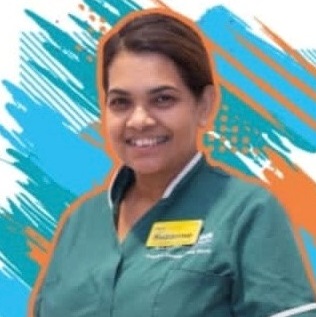Home News & Views Taking RBCS forward: A paediatric practice development nurse perspective
Taking RBCS forward: A paediatric practice development nurse perspective
 Suzanne Mcfarlane, paediatric practice development nurse, North Middlesex
Suzanne Mcfarlane, paediatric practice development nurse, North Middlesex
Hello, my name is Suzanne Mcfarlane (PDN.) I love my role as an educator in clinical practice. I support nurses, pre and post registration with their development. I believe if you look after your staff well, you will get the best out of them. I work with a diverse team which has made me become a better educator because of the need to understand culture and backgrounds. This helps me be responsive to individual learning needs.
I was really keen to have a go at facilitating RBCS, my newly found skills, as I saw this as a natural progression to become better at my role and to meet the additional COVID challenges on staff wellbeing.
Champion and Cascade programme Clinical Supervision Resources
I completed a RBCS programme in 2021. I never knew thirteen hours over a period of five sessions delivered virtually would have such an impact on me. I have facilitated clinical supervision and action learning sets in the past but always felt it didn’t work unless emotional systems were explored first.
RBCS focusses on the three emotional regulatory systems of ‘threat’, ‘soothe’ and ‘drive’ and how these affect decision making, based on Paul Gilbert’s work on the Compassionate Mind.
The COVID 19 pandemic and has taken a toll on health professionals leaving them feeling ‘burntout’, ‘anxious’ and ‘stressed’. I have become very passionate about facilitating RBCS and have spent time reading more about the topic, mastering grounding strategies, practising mindfulness and personal reflections to learn more and develop my confidence.
Implementation: I was very keen to facilitate RBCS to help others in my service. I started by creating posters which were displayed in all paediatric areas, I delivered a presentation to the paediatric team virtually and have been sharing progress on Twitter. This growing awareness led to a meeting with the education leads, who were very impressed by how RBCS had taken off in paediatrics. They wanted to look at extending these sessions trust wide and it has now become part of the preceptorship programme.
Moving forward, I also plan to contribute to the overall evaluation of the programme and continue implementation on a wider scale. I recently attended a meeting where we are trying to bring together the Professional Nurse Advocate role with RBCS and are currently developing a policy to enable staff to access six sessions of RBCS per group/ individual per year to enable change.
RBCS Community of Practice (CoP) and personal changes
As part of RBCS programme across the North London Partnership Integrated Care System, a community of practice (CoP) was set up to provide ongoing support for facilitators. This is a fantastic forum that I eagerly look forward to. It has been very useful in helping me sustain implementation of RBCS.
More importantly having the opportunity to receive RBCS myself has enabled me to showcase my caring side, be non-judgmental and I have learnt that being assertive when calm (soothe) achieves better outcomes. It has made me less anxious and more sympathetic to leaders and managers who may become stressed and as a result may become coercive in decision making.
This awareness has helped me to resolve a conflict situation I was involved with. And in terms of self-care, I have made a few changes to improve my work life balance. I have taken up walking on my days off and at work during my lunch breaks. I have reduced the time I spend catching up on work on my off days. I sometimes work on my days off but now tend to prioritise self-care tasks first.
Who I have worked with
I have facilitated twenty-five sessions in total in a variety of settings and professionals with preceptors, the play team, as part of study days, for clinical nurse specialists, at away days, for students and even for a consultant.
What staff say that attend the sessions
‘It’s really good to talk’
‘We care about each other really’
‘I will be aware of when I am in my threat system’
‘I will definitely practise grounding’
‘I will try to not believe my inner critique voice’
‘It’s difficult to ignore my negative thoughts but I know now it’s not helpful to me’
My observations
RBCS has encouraged more engagement, honesty and appreciation between colleagues. We often don’t know what other people are thinking or what their motivations are and RBCS helps us to think about this. Staff members’ confidence is boosted by knowing how much they are appreciated by colleagues.
Grounding can be very important during a busy day. Often staff take their stress home with them and grounding has helped them to manage their emotions during the working day.
RBCS can help when there is conflict by providing a safe space to reflect on and express emotions.
Why not give it a try?
Comments are closed.

